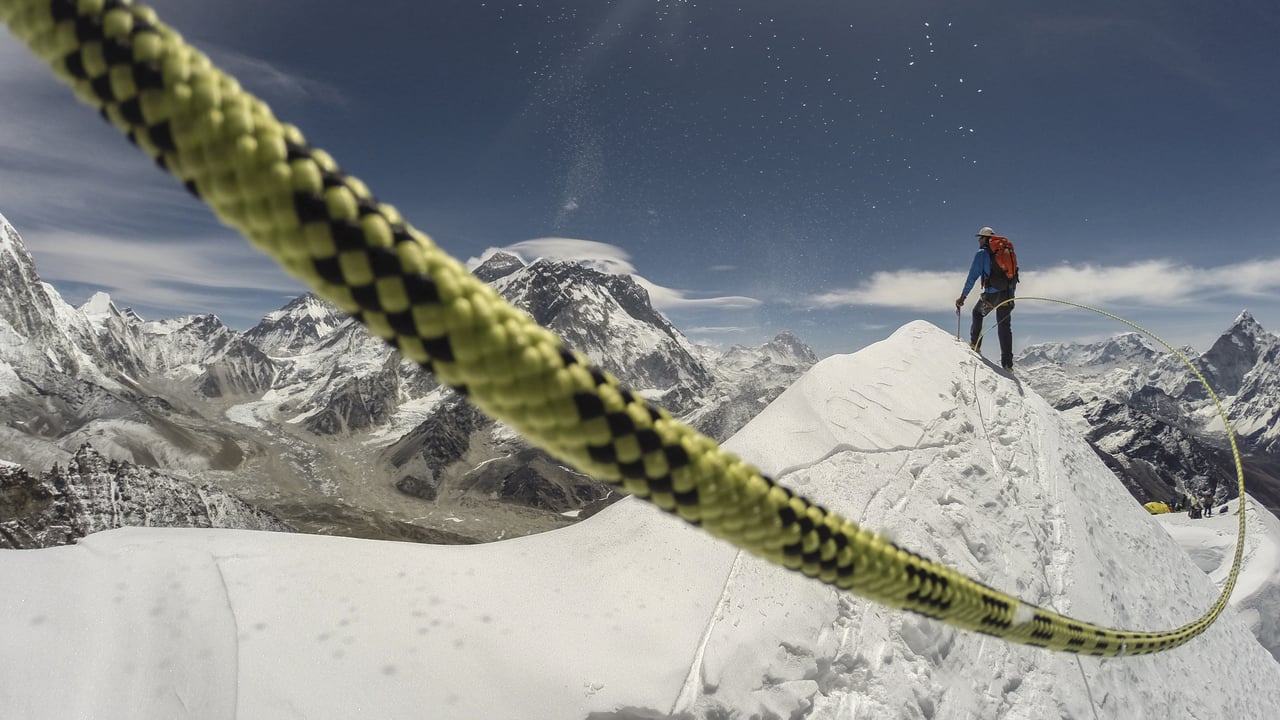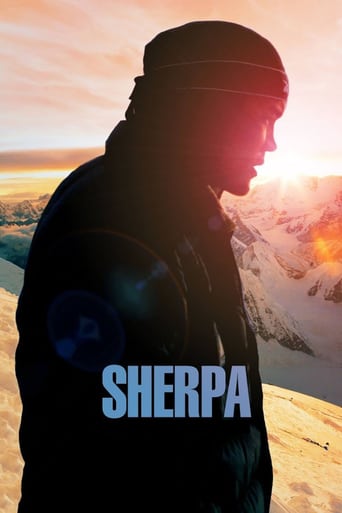

I loved this documentary as I like many people am fascinated by Chomolungma, being it's the highest Mountain on Earth.The name 'Everest' should and the verb 'to summit' should be immediately be red flags. Nothing was discovered in the 1800s. Being named after some colonial white guy by the Royal Geographical Society instead of being called the Holy Mother in the local language. Hindi or Nepali Sagarmāthā, are much nicer names.I really think though that when you use and abuse locals and make things easy for people to climb and insult this mountain this should honestly be reflected in any film made about it. The things missing from this film about exactly the work that Sherpas do, how they really feel, and the selfishness of the capitalist system that allows people to try and tick off the 'biggest and best' when ethically what those customers are doing is highly questionable. How much really do the Sherpas earn as percentage? Shouldn't there be excellent schools, hospitals and adequate insurance for Sherpas? Some of the problems with garbage and climate change are not properly covered at all.Capitalistic money making from a Holy mountain should be properly regarded as a pretty hollow occupation, and someone risking their life to feed their family as pretty heroic, but this film seems sided with climbing company owners and clients by trying to be balanced between each side, when really one side is in the right and the other isn't.At the end of the day a real climber would walk up from sea level, hire a local directly or not at all, go without oxygen especially if under 8000 meters and bring all their own supplies in and out.
... View MoreWhilst this is a very well made, very well shot documentary, there was some hypocrisy from the makers. The film's perspective is that the Sherpas are good and the Western tourists are bad. The film makes a point about how there are a lot of reckless foreigners on the mountain and film crews, but the people making this documentary themselves are a film crew. While the film is very well shot, it does have some very difficult shots that would take lots of planning and potentially be unsafe for some people such as the people driving the helicopter. One of the film's main focuses is on how the Sherpa's lives are at risk because of some people who want to climb the mountain. The film is definitely worth seeing though and has some very impressive shots.
... View MoreAttending the Sydney Film Festival, I had been waiting all Festival for that piece of cinematic magic that just leaves you breathless and desperate to run out of the theatre so that you can share it with everyone you know. I found that with director Jennifer Peedom's impassioned documentary Sherpa. Initially envisioned as an exploration of the deteriorating relationship between Sherpas and foreign climbers from the Sherpas perspective - particularly after the highly publicised 2013 Base Camp 1 brawl between European climbers and Sherpas - Sherpa quickly becomes a real-time chronicle of the worst loss of human life on Mt Everest in a single day.Beginning with a series of majestic perspectives and time-lapse shots of the mother mountain, high-altitude cinematographers Renan Ozturk, Hugh Miller and Ken Saul – globally renown mountaineers in their own right – manage to capture the formidable, yet poetic beauty of Everest's peak as jet stream winds billow across it's dangerous edges. It's a wondrous sight, juxtaposed by crunching crampons and ice shifts that remind you of Everest's dangerously fragile environment.So too does Peedom's thoughtful and oft times, entertaining introduction to Himalayan Experience's Sirdar Phurba Tashi Sherpa and his family. The current world record holder for the most total ascents of peaks above 8,000, and joint record holder for the most ascents (21) of Mt Everest, Phurba and his family are all too aware of Everest's rising exigency both on and off the peak. 'My brother died on Everest last year' Phurba's wife Karma Dopa Sherpa shares as she fights back tears on screen 'he went because he needed the money'. Phurba understands his wife's concerns and knows culturally that it is wrong to climb the mountain they call Chomolungma but he also enjoys what he does. The income generated by the most dangerous job in the word not only financially benefits Sherpas families but it also benefits their entire community for the whole year. Humorously, Phurba's mother fails to agree with her son stating 'if he was a famous Monk, at least he would get blessings. But the fame he gets from the mountain is useless'.Writer and journalist Ed Douglas shares this opinion as he presents throughout the film, a clear picture of the growing divide between the Sherpas cultural integrity and intrusive western commercialisation that one can't help but be appalled by. So too is the disproportionate contributions and risks Sherpas shoulder compared to their clients. Whilst wealthy westerners pay up to $75,000 to conquer their ultimate bucket list challenge, Sherpas earn a meager $5,000 to risk their lives up to 30 times per season for their clients, are rarely acknowledged or thanked publicly for their contribution to the climbers ascent, nor often respected for their cultural beliefs.Early in the film, as Sherpas set up Everest base camp from scratch in anticipation of their western clients, Peedom gives audiences subtle glimpses of outrageous and shameful western excess and expectation: flat screen TV's, portable showers, bar areas, and an equipped library. There's a scene following the tent village preparations where two Sherpas are offering coffee to clients as they cheerily wish them good morning at their tent. After serving the first client who returns the Sherpas greetings and thanks them for the coffee, the following client responds by asking for sugar and no milk as if they are at their local Costa rather than over 5,000 m above sea level. It's truly a head shaking moment.So too is the client meeting held between Himalayan veteran Russell Brice of Himalayan Experience and his commercial expedition group following the avalanche. As one of the last expedition groups to cancel their summit bids, not all of Brice's clients were happy. One American climber suggests Brice seek out 'the owner' of the unruly Sherpas and have them removed from the camp and later compares the cancellation of the season due to the Sherpas respect for their lost friends, their families and the mountain to a terrorist attack like 9/11 since America knows all about that. Boy did that incredulous statement make the audience laugh! At certain points in the film, it's hard to find sympathy for the expedition operators and climbers bemoaning the loss of their ascent attempt and revenue as Sherpas mourn the 16 Sherpas who died but Peedom manages to find a respectful balance between the parties during and following the tragedy on screen. You can feel the raw emotions of expedition operators and their crews, medical staff, Sherpas and concerned climbers as they traverse from casualty and body recovery to confusion and frustration following the tragedy and finally, the Sherpas evaluation of their role on Everest and the increasing dangers on the mountain due to climate change. Whilst Sherpa documents a horrific tragedy in real-time, it also acts as the dramatic backdrop for industrial dispute that's been simmering under the surface sky for a long time. Douglas concurs 'Tenzing gave the name Sherpa a currency that will never be exhausted and they are now finally beginning to take advantage of that'.I couldn't agree more.Sherpa is an extraordinary and soulful documentary, where there's death in beauty and beauty in death. As Tenzing Norgay says 'you don't conquer these mountains, you know; you just crawl up, as a child crawling onto your mothers lap'.
... View MoreI went in expecting a 'spectacle documentary' but Sherpa turned out to be so much more.As with so so many great documentaries, the film-makers went in expecting to make one type of film and came out with something much more than they could surely have hoped.The spectacle of the cinematography should be enough to draw an audience; if that fails the human story is powerful - moments of heavy emotion and a heart-rending look in a wife's eyes still rattle about in my head. Many other themes are strewn throughout also, giving the film a pleasing depth - politics, racial divides and differences, economic realities of mountain life and exploitation of nature amongst them.One of the greatest triumphs for me is that we go on our own expedition with the subjects but also with the film-makers: As their plans become derailed and their film goes in a direction they could not have expected we join them - We find ourselves embroiled in real- life drama and tragedy in perhaps the most dramatic of all locations on Earth.
... View More